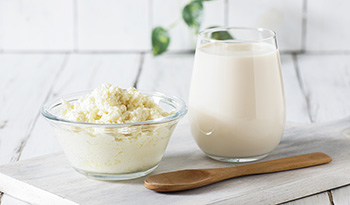What Is Inositol Good For? 6 Health Benefits Explained

Key Takeaways
- Inositol is a type of sugar naturally made in the body that acts as a key cell-signaling molecule. The most common forms of supplements are myo-inositol and D-chiro-inositol.
- Inositol is most well-researched for improving symptoms of PCOS, including regulating menstrual cycles and supporting fertility.
- It has been shown to improve insulin resistance, lower blood sugar levels, and support healthy weight management.
- Research suggests inositol may also offer benefits for mental health, including improving symptoms of depression and anxiety.
What Is Inositol?
Inositol is a type of sugar that is naturally made in the body but can also be found in a variety of high-fiber foods like fresh fruits, vegetables, beans, and legumes.
Inositol can be found in a variety of different forms in nature, with myo-inositol and d-chiro-inositol being the most abundant and commercially available.
Inositol plays an important role in the body as a cell signaling molecule, but recent research has shown that inositol may have other benefits, ranging from women’s health to mood support.
Benefits Of Inositol
1. Inositol May Help Improve Polycystic Ovary Syndrome (PCOS)
Polycystic ovary syndrome, also called PCOS, is a complex condition involving the endocrine system. Research suggests that this condition may affect between 6-20% of women of reproductive age. With PCOS, the ovaries may become enlarged and develop small cysts around the outer edges.
PCOS may also cause an excess of androgen production in females. Androgens are predominantly male hormones that contribute to male secondary sex characteristics like larger muscle development and chest hair growth.
While androgens are naturally occurring in females, they are often present in smaller amounts in women without PCOS. Since PCOS may contribute to higher production of androgens in females, this may result in facial and body hair growth in women, excess acne, and irregular or nonexistent periods.
PCOS may also affect the body metabolically, contributing to increased abdominal weight gain, higher cholesterol and triglycerides levels, and insulin resistance. Studies suggest that inositol may be beneficial for those struggling with PCOS.
For example, one randomized open-label study focused on the effects of inositol on regulating the menstrual cycle. The study involved 70 young women aged 15-24 years old. The women were separated into one of two groups: a group that received a mixture of both myo-inositol and D-chiro-inositol as well as a hormonal contraceptive, and another group that only received a hormonal contraceptive.
The study followed the women for 6 months. At its conclusion, the study found that both those in the inositol and contraceptive groups experienced a spontaneous return of menstruation and a shorter menstrual cycle. A total of 30 women in the contraceptive group and 9 women in the inositol group achieved a regular menstrual cycle. When both groups stopped their respective interventions after 3 months, a similar number of women continued to have spontaneous menstrual cycles: 24 in the inositol group and 25 in the contraceptive group.
Another meta-analysis looked at data from 26 different randomized controlled trials to determine the efficacy of inositol on PCOS. The study found that inositol was almost two times superior to a placebo in helping women establish a regular menstrual cycle. The study also found that inositol performed similarly to metformin in bettering PCOS outcomes.
2. Inositol May Help Improve Insulin Resistance
Insulin is an essential hormone that is secreted by the pancreas. The job of insulin is to take glucose or sugar out of the bloodstream and move it into the cells. The cells are then able to use that glucose as energy to perform their normal functions in the body.
Insulin resistance occurs when the body no longer responds to insulin in the way that it normally would. Insulin resistance may lead to higher blood sugar levels and an increased risk of developing diabetes.
Studies suggest that inositol may help to improve the body’s response to insulin by reducing both blood sugar levels and insulin levels in the bloodstream.
One placebo-controlled study found that inositol supplementation was able to reduce the insulin area under the curve after a glucose tolerance test by almost 62% as compared to placebo. Another randomized placebo-controlled study found that the incidence of gestational diabetes was reduced with myo-inositol supplementation.
3. Inositol May Benefit Metabolic Dysfunction
Studies suggest that inositol may not only improve insulin resistance but may also be helpful for other areas of metabolic dysfunction. The placebo-controlled study that found a reduction in insulin area under the curve with inositol supplementation also found a decrease in serum testosterone and triglyceride levels. The same study also found a decrease in both systolic and diastolic blood pressure by 4 millimeters of mercury (mmHg) compared to the placebo group.
One meta-analysis that included data from over 1,600 patients found that inositol supplementation was associated with lower serum testosterone and glucose levels compared to placebo.
4. Inositol May Help With Weight Management
According to the World Health Organization, approximately 39% of the world’s adult population can be classified as overweight, with 13% of those being clinically obese. Obesity is defined as having a body mass index (BMI) equal to or greater than 30. Obesity has been linked to a variety of health problems, ranging from cardiovascular disease to certain cancers.
Studies suggest that inositol may help to reduce obesity. One meta-analysis focused on the effects of an inositol supplement on BMI and reviewed data from 15 randomized controlled studies. The study found that inositol supplementation was associated with a decrease in BMI and that myo-inositol may be the most effective form to help with BMI reduction.
5. Inositol May Benefit Fertility
Infertility is clinically defined as the inability to achieve a pregnancy within a year of unprotected sexual intercourse. The World Health Organization (WHO) has estimated that infertility may affect around 1 in 6 people worldwide. This comes out to about 17.5% of the world population having trouble conceiving.
Research suggests that inositol may help increase fertility and support reproduction.
One randomized controlled study focused on the effects of supplementing melatonin and inositol on the rates of fertilization and egg quality. Melatonin is a hormone secreted by the pineal gland that helps regulate the circadian rhythm and sleep. It may also act as a powerful antioxidant. In the study, 526 women who had been diagnosed with PCOS and in vitro fertilization (IVF) treatment were separated into 1 of 3 groups: a control group receiving only folic acid, a group receiving inositol and folic acid, and a group receiving inositol, folic acid, and melatonin.
The women were treated with their respective interventions from the first day of their cycle until 2 weeks after the embryo was implanted. The study found that those in the melatonin and inositol group had a greater number of mature eggs compared to the other groups. The melatonin and inositol group also had a higher number of potentially viable embryos than the other groups.
6. Inositol May Benefit Anxiety and Depression
Research indicates that inositol may benefit more than just hormonal imbalances. The benefits of inositol may include mental health as well.
One meta-analysis focused on the effects of inositol on anxiety and depression. The study found that patients with depression associated with premenstrual dysphoric disorder saw benefits with inositol supplementation.
Another double-blind, placebo-controlled study involving patients with major depressive disorder and bipolar disorder showed significant improvements in their depressive symptoms compared to placebo.
It is important to note that other studies have found no difference in the reduction of depressive symptoms with inositol supplementation, so more studies are needed to understand the role inositol may play in mental health disorders.
Potential Inositol Side Effects
If taking an inositol supplement, it is important to review and understand any potential inositol side effects. Common side effects that may be experienced when taking inositol include:
- Nausea
- Bloating
- Gas
- Flatulence
- Diarrhea
- Headache
- Feeling Lightheaded Or Dizzy
- Fatigue
These side effects are experienced more often in high-dose inositol supplementation and/or long-term inositol use.
One study found that long-term use of high doses of chiro-inositol in healthy women promoted higher levels of testosterone and asprosin secretion. Testosterone is a predominantly male hormone associated with the development of male secondary sex characteristics, while asprosin is a hormone that contributes to raising blood sugar levels.
Frequently Asked Questions (FAQ)
What is the best form of inositol to take?
For PCOS and metabolic issues, a combination of myo-inositol and D-chiro-inositol is the most studied and recommended form. Myo-inositol alone is often used for mood support.
How long does it take for inositol to work for PCOS?
While it varies, many studies show improvements in menstrual regularity and metabolic markers within 3 to 6 months of consistent use.
Can you take inositol every day?
Yes, inositol is generally considered safe for daily use at recommended dosages. Mild digestive side effects like gas or bloating can occur, especially at higher doses.
Conclusion
Inositol benefits range from potentially helping improve the lives of women suffering from PCOS to supporting healthy weight loss. This amazing body-made molecule is essential for maintaining optimal health and wellness. Adding an inositol supplement to an overall wellness routine may help to improve health for years to come.
References:
- Zarezadeh M, Dehghani A, Faghfouri AH, et al. Inositol supplementation and body mass index: a systematic review and meta-analysis of randomized clinical trials. Obes Sci Pract. 2022; 8(3): 387-397. https://doi.org/10.1002/osp4.569
- 1 in 6 people globally affected by infertility: Who. World Health Organization. https://www.who.int/news/item/04-04-2023-1-in-6-people-globally-affected-by-infertility#:~:text=Around%2017.5%25%20of%20the%20adult,care%20for%20those%20in%20need.
- Bevilacqua A, Bizzarri M. Inositols in Insulin Signaling and Glucose Metabolism. Int J Endocrinol. 2018;2018:1968450. Published 2018 Nov 25. doi:10.1155/2018/1968450
- Chen W, Pang Y. Metabolic Syndrome and PCOS: Pathogenesis and the Role of Metabolites. Metabolites. 2021;11(12):869. Published 2021 Dec 14. doi:10.3390/metabo11120869
- Clements RS Jr, Darnell B. Myo-inositol content of common foods: development of a high-myo-inositol diet. Am J Clin Nutr. 1980;33(9):1954-1967. doi:10.1093/ajcn/33.9.1954
- D'Anna R, Scilipoti A, Giordano D, et al.. Myo-Inositol supplementation and onset of gestational diabetes mellitus in pregnant women with a family history of type 2 diabetes: a prospective, randomized, placebo-controlled study. Diabetes Care 2013;36:854–7.
- Dinicola S, Minini M, Unfer V, Verna R, Cucina A, Bizzarri M. Nutritional and Acquired Deficiencies in Inositol Bioavailability. Correlations with Metabolic Disorders. Int J Mol Sci. 2017;18(10):2187. Published 2017 Oct 20. doi:10.3390/ijms18102187
- DiNicolantonio JJ, H O'Keefe J. Myo-inositol for insulin resistance, metabolic syndrome, polycystic ovary syndrome and gestational diabetes. Open Heart. 2022;9(1):e001989. doi:10.1136/openhrt-2022-001989
- Greff D, Juhász AE, Váncsa S, et al. Inositol is an effective and safe treatment in polycystic ovary syndrome: a systematic review and meta-analysis of randomized controlled trials. Reprod Biol Endocrinol. 2023;21(1):10. Published 2023 Jan 26. doi:10.1186/s12958-023-01055-z
- Kachhawa G, Senthil Kumar KV, Kulshrestha V, Khadgawat R, Mahey R, Bhatla N. Efficacy of myo-inositol and d-chiro-inositol combination on menstrual cycle regulation and improving insulin resistance in young women with polycystic ovary syndrome: A randomized open-label study. Int J Gynaecol Obstet. 2022;158(2):278-284. doi:10.1002/ijgo.13971
- Levine J., Barak Y., Gonzalves M., Szor H., Elizur A., Kofman O., Belmaker R.H. Double-blind, controlled trial of inositol treatment of depression. Am. J. Psychiatry. 1995;152:792–794. doi: 10.1176/ajp.152.5.792
- Mukai T, Kishi T, Matsuda Y, Iwata N. A meta-analysis of inositol for depression and anxiety disorders. Hum Psychopharmacol. 2014;29(1):55-63. doi:10.1002/hup.2369
- Nestler JE, Jakubowicz DJ, Reamer P, Gunn RD, Allan G. Ovulatory and metabolic effects of D-chiro-inositol in the polycystic ovary syndrome. N Engl J Med. 1999;340(17):1314-1320. doi:10.1056/NEJM199904293401703
- Nordio M, Bezerra Espinola MS, Bilotta G, Capoccia E, Montanino Oliva M. Long-Lasting Therapies with High Doses of D-chiro-inositol: The Downside. J Clin Med. 2023;12(1):390. Published 2023 Jan 3. doi:10.3390/jcm12010390
- Obesity and overweight. World Health Organization. https://www.who.int/news-room/fact-sheets/detail/obesity-and-overweight.
- Russo M, Forte G, Montanino Oliva M, Laganà AS, Unfer V. Melatonin and Myo-Inositol: Supporting Reproduction from the Oocyte to Birth. Int J Mol Sci. 2021;22(16):8433. Published 2021 Aug 5. doi:10.3390/ijms22168433
DISCLAIMER:This Wellness Hub does not intend to provide diagnosis...

















































































 Table of Contents
Table of Contents














